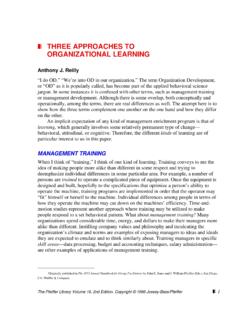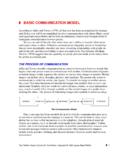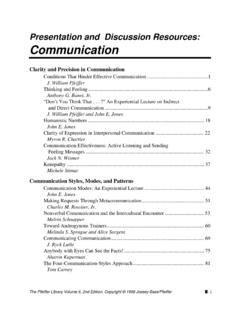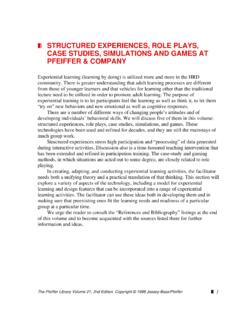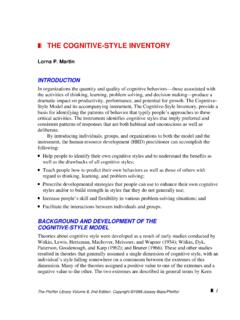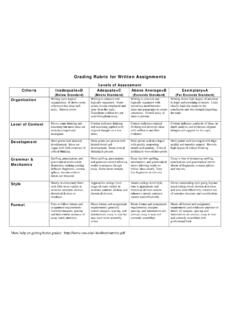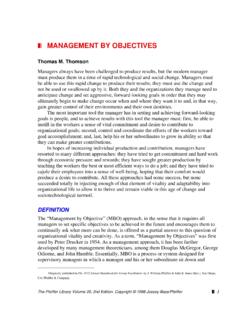Transcription of CONDITIONS THAT HINDER EFFECTIVE COMMUNICATION
1 The Pfeiffer Library Volume 6, 2nd Edition. Copyright 1998 Jossey-Bass/Pfeifferzx 1zxCONDITIONS THAT HINDEREFFECTIVE COMMUNICATION J. William PfeifferA person s interpersonal life is dependent on that person s facility for making his or herthoughts, feelings, and needs known to others and on that person s receptiveness to theattempts of others to share similar data with him or her. COMMUNICATION , a multifacetedphenomenon, is the result of efforts by individuals toward this end. COMMUNICATION canbe considered in simplistic terms as the sending and receiving of messages, as bothelements must be present for COMMUNICATION to take place. However, the fundamentaltransaction of message sent and received does not presuppose that COMMUNICATION hasoccurred.
2 Often, it has only partially occurred or has been aborted entirely as a result ofthe circumstances surrounding the occasion when the COMMUNICATION attempt was circumstances may be environmental, emotional, verbal-skill oriented,phenomenological, or resulting from a host of CONDITIONS present within the individualswho are attempting to analogy may help to clarify the concept of the effect of circumstances on theeffectiveness of sending and receiving messages. In the late afternoon when you observea sunset, the sun often appears to be a deep red, larger and less intense than it seems atmidday. This is due to the phenomenon of refraction, the bending of the light rays asthey pass through the earth s atmosphere, and the higher density of dust in the airthrough which the light passes as the sun goes down.
3 The sun has already moved belowthe horizon, but it is still in sight because its emissions are distorted by the CONDITIONS ofthe medium through which they must travel. In a similar way the messages that we sendto one another are often refracted by intrapersonal, interpersonal, and environmentalconditions that contribute to the atmosphere in which we are relating. I may distort mymessage to you by giving out mixed messages verbally and symbolically, and you maydistort what you hear because of your own needs and experiences. The two of us may belocated in an environment, physical and psychological, that contributes to the difficultyin clearly sharing what we intend. In an atmosphere of suspicion, for example, we mayboth become unduly cautious in our it is unlikely that totally nonrefracted COMMUNICATION is a possibility overtime between any two people or with significant others with whom we must dealinterpersonally, an awareness of CONDITIONS that block and alter the intention of sent andreceived messages may produce less refraction and better COMMUNICATION in the longrun.
4 Originally published in The 1973 Annual Handbook for Group Facilitators by John E. Jones and J. William Pfeiffer (Eds.), San Diego,CA: Pfeiffer & Pfeiffer Library Volume 6, 2nd Edition. Copyright 1998 Jossey-Bass/Pfeiffer2 xzSome of the CONDITIONS that cause refraction can be labeled and examined in light oftheir impact on EFFECTIVE communications:npreoccupationnemotional blocksnhostilityncharismanpast experiencesnhidden agendasninarticulatenessnstereotypingnph ysical environmentnmind wanderingndefensivenessnrelationshipsnst atus1. Preoccupation. A person who is focusing on internal stimuli may listen in such away that none of the message comes through or so little of it that he or she cannot graspthe message appropriately and may respond in such a way that the blocking of themessage is apparent.
5 A story is told of a columnist in New York who attended numerouscocktail parties and had come to believe that a certain socialite was so preoccupied withmaking an outstanding impression on her guests that she was unable to hear anythingthey were saying. To test his theory he came late to her next party; when he was greetedeffusively at the door by the hostess, he said, I m sorry to be late, but I murdered mywife this evening and had a terrible time stuffing her body into the trunk of my car. Thesuper-charming hostess beamed and replied, Well, darling, the important thing is thatyou have arrived, and now the party can really begin! 2. Emotional blocks. A second condition may be an emotional block to the directionthat the message is taking.
6 Words may have become charged with emotion for a person,possibly due to that person s conditioning in childhood or to current circumstances in hisor her life at the time the COMMUNICATION attempt is made. An example might be of thewell-intentioned but unaware adult white male, who, in speaking to an adult black male,makes reference to you colored boys. Similarly, a woman who is having difficulty inconceiving a child may not be able to discuss Aunt Mary s comment, Now that you andBob have been settled for a few years, it would be nice to start a family ; or she mayfind herself responding irrationally to a lecture on population Pfeiffer Library Volume 6, 2nd Edition. Copyright 1998 Jossey-Bass/Pfeifferzx 33.
7 Hostility. Hostility may create refraction of messages. This can occur whencommunicating with a person with whom you are angry, or it may be a carryover from arecent experience. It may also be the subject matter that arouses hostility. When twopeople are engaged in a hostile confrontation, each often distorts messages from theother in such a way that provides fuel for further venting of hostility. A husband and awife may have the following type of exchange of messages: He: I really thought I washelping you when I .. She: Are you trying to tell me that I was incapable of .. He: You aren t capable of much of anything! Just look at the state of our finances. Thehusband s intended message was I know I ve made you angry by my action.
8 Where didI go wrong? The angry wife chose to interpret the word help as an accusation that shelacked the resources to handle the situation. Her message elicits further distortion andhostility from the husband. In another example, a woman may come home from justhaving had a confrontation with her boss and may carry over her hostility to her familyby overreacting to her husband s messages concerning the day s irritations, or she maysimply filter out all messages and respond in monosyllables to any attempts atcommunication. The subject matter being dealt with may engender hostility and therebydistort the message. A father may comment that his son should plan to have his hairtrimmed for his sister s wedding and find that his message has been refracted as an all-encompassing criticism of his son s life Charisma.
9 The charisma of the sender of a message may affect how the messageis received. Political candidates are often chosen more for their possession of this qualitythan for their other attributes. A charismatic person can often make tired, trivialmessages seem new and important to the recipient; however, this too can becomedetrimental to COMMUNICATION , as the receiver of the message is less likely to question orask for clarification of the message. How often have we come away enthusiasticallyfrom having heard a dynamic speaker, only to discover that we cannot actuallyremember the content of the speech? Conversely, a person who has something importantand unique to say to us may not be able to hold our attention in such a fashion that wehear the message he or she is Past experience.
10 Our experience can predispose us to refraction. If our weeklystaff meetings have always been a waste of time, we may come into each succeedingmeeting expecting not to give the messages that are sent much consideration or to hearthem as having no relevant implications. Staff meetings may also nurture another kindof condition that may create message Hidden agendas. A person with a special interest, that is, a hidden agenda, mayhear all messages only in reference to his or her own needs or may not be able to hearmessages that do not relate to his or her own interest. If the hidden agenda is incompetition with the message of another employee, he or she may reject all suggestionsmade by that other employee or may attempt to manipulate others into distorting theother employee s messages.
